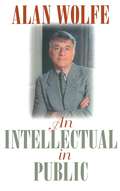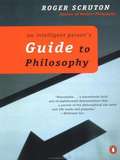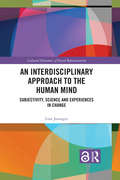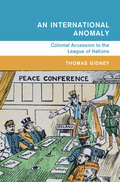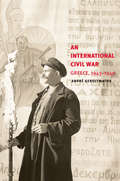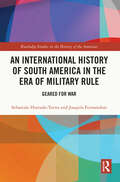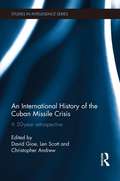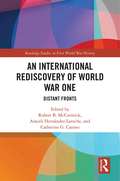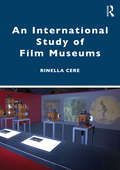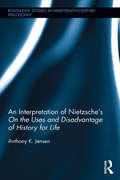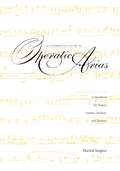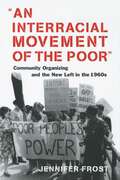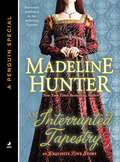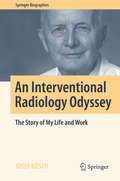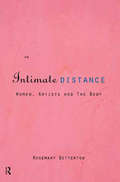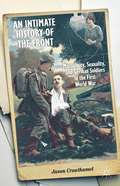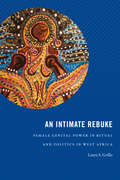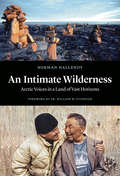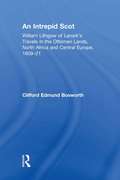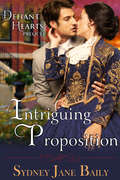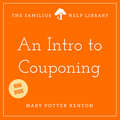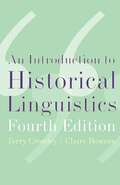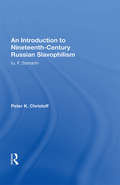- Table View
- List View
An Intellectual in Public
by Alan WolfeA new collection of essays from one of the most courageous and honest thinkers writing today "The question of the public intellectual is very much in the air again," writes Alan Wolfe. As one of our eminent social commentators, Wolfe should know; he's been writing, with fierce intellectual independence, about American public and private life since the 1960s. In this new collection of essays spanning seven years of contributions to The New Republic, The New Yorker, Atlantic Monthly, and other prominent publications, Wolfe displays the courage necessary to write honestly--yet free of ideology, cant, and piety--about the things Americans take very seriously. Wolfe thinks big; indeed, the essays in An Intellectual in Public confront many of the most controversial issues of our time: country, God, race, sex, material consumption, and left and right. Beginning and ending the book are original essays describing the public intellectual's role, and how Wolfe believes that role ought to be filled. An Intellectual in Public is not only a demonstration of Wolfe's pointed analytical skills but a testament to his belief that "severely ideological thinking" is inappropriate for some of our most difficult problems, and that "neither the right nor the left can speak for all of America. " Alan Wolfe is the director of the Boisi Center for Religion and American Public Life and also Professor of Political Science at Boston College. He is the author of over a dozen books, including One Nation After All: What Middle Class Americans Really Think About: God, Country, Family, Racism, Welfare, Immigration, Homosexuality, Work, the Right, the Left and Each Other.
An Intelligent Person's Guide to Philosophy
by Roger Scruton"Philosophy's the 'love of wisdom', can be approached in two ways: by doing it, or by studying how it has been done," so writes the eminent philosopher Roger Scruton. In this user-friendly book, he chooses to introduce philosophy by doing it. Taking the discipline beyond theory and "intellectualism," he presents it in an empirical, accessible, and practical light. The result is not a history of the field but a vivid, energetic, and personal account to guide the reader making his or her own venture into philosophy. Addressing a range of subjects from freedom, God, reality, and morality, to sex, music, and history, Scruton argues philosophy's relevance not just to intellectual questions, but to contemporary life. .
An Interdisciplinary Approach to the Human Mind: Subjectivity, Science and Experiences in Change (Cultural Dynamics of Social Representation)
by Line JorangerOne of the main aims of modern mental health care is to understand a person's explicit and implicit ways of thinking and acting. So, it may seem like the ultimate paradox that mental health care services are currently overflowing with brain concepts belonging to the external, visible brain-world and that neuroscientists are poised to become new experts on human conduct. An Interdisciplinary Approach to the Human Mind shows that to create care that is truly innovative, mental health care workers must not only ask questions about how their conceptions of human beings and psychological phenomena came into being, but should also see themselves as co-creators of the mystery they seek to solve. Looking at the human being as a being with a biological body and unique subjective experiences, living in a reciprocal relationship with its sociocultural and historical environment, the book will provide examples and theories that show the necessity of an innovating, interdisciplinary mental health care service that manages to adapt its theory and methods to environmental, biological, and subjective changes. To this end, the book will provide an innovating psychology that offers a broad kaleidoscope of perspectives about the relations between the history of psychology, as a scientific discipline oriented to interpret and explain subject and subjectivity phenomenon, and the social construction of subjectified experience. This unique and timely book should be of great interest to critical and cultural psychologists and theorists; clinical psychologists, therapists, and psychiatrists; sociologists of culture and science; anthropologists; philosophers; historians; and scholars working with social and health theories. It should also be essential reading for lawyers, advocates, and defenders of human rights. The Open Access version of this book, available at https://www.taylorfrancis.com/books/9781315309682 has been made available under a Creative Commons Attribution-Non Commercial-No Derivatives 4.0 licence.
An International Anomaly: Colonial Accession to the League of Nations (Global and International History)
by Thomas GidneyIt is often assumed that only sovereign states can join the United Nations. But this was not always the case. At the founding of the United Nations, a loophole drafted by British statesmen in its predecessor organisation, the League of Nations, was carried forward, allowing colonies to accede as member-states. Colonies such as India, Ireland, Egypt, and many more were afforded a tokenistic representation at the League in Geneva during the interwar years, decades before their independence. Thomas Gidney unites three geographically distinct case studies to demonstrate the evolution of Britain's policy from a range of different viewpoints, exploring how this policy came into being, and why it was only exploited by the British Empire. He argues that this membership shaped colonial norms around sovereignty and international recognition in the interwar period and to the present day. This title is also available as open access on Cambridge Core.
An International Civil War: Greece, 1943-1949
by André GerolymatosAn authoritative history of the Greek Civil War and its profound influence on American foreign policy and the post–Second World War period In his comprehensive history André Gerolymatos demonstrates how the Greek Civil War played a pivotal role in the shaping of policy and politics in post–Second World War Europe and America and was a key starting point of the Cold War. Based in part on recently declassified documents from Greece, the United States, and the British Intelligence Services, this masterful study sheds new light on the aftershocks that have rocked Greece in the seven decades following the end of the bitter hostilities.
An International History of South America in the Era of Military Rule: Geared for War
by Joaquín Fermandois Sebastián Hurtado-TorresBased on research conducted in archives in six countries, An International History of South America in the Era of Military Rule: Geared for War offers a detailed account of the tensions and fears of war that engulfed South America in the 1970s, when most countries of the region were ruled by military governments. Scholars of contemporary history and international relations, graduate and undergraduate students of Latin American history, and anyone interested in issues of international history will gain from reading this book, which explores the long-standing territorial controversies that underlay international rivalries, the incidence of military thinking in them, and the multifarious effects of the international order of the Cold War in the rise of tensions in South America in the era of military rule. Since war did not break out in South America in the 1970s, the book also stands as a study of the reasons why peace prevailed, even under conditions that seemed conducive to its demise. As a study based on multiarchival research, the book offers an original narrative and analysis of a topic scarcely treated by scholarly literature on the history of South America in the twentieth century, which makes it useful and interesting for audiences in various countries of the region.
An International History of the Cuban Missile Crisis: A 50-year retrospective (Studies in Intelligence)
by Christopher Andrew Len Scott David GioeThis edited volume addresses the main lessons and legacies of the 1962 Cuban Missile Crisis from a global perspective. Despite the discoveries of recent research, there is still much more to be revealed about the handling of nuclear weapons before and during the Cuban Missile Crisis (CMC). Featuring contributions from a number of eminent international scholars of nuclear history, intelligence, espionage, political science and Cold War studies, An International History of the Cuban Missile Crisis reviews and reflects on one of the critical moments of the Cold War, focussing on three key areas. First, the volume highlights the importance of memory as an essential foundation of historical understanding and demonstrates how events that rely only on historical records can provide misleading accounts. This focus on memory extends the scope of the existing literature by exploring hitherto neglected aspects of the CMC, including an analysis of the operational aspects of Bomber Command activity, explored through recollections of the aircrews that challenge accounts based on official records. The editors then go on to explore aspects of intelligence whose achievements and failings have increasingly been recognised to be of central importance to the origins, dynamics and outcomes of the missile crisis. Studies of hitherto neglected organisations such as the US Defense Intelligence Agency (DIA) and the British Joint Intelligence Committee (JIC) both extend our understanding of British and American intelligence machinery in this period and enrich our understanding of key episodes and assessments in the missile crisis. Finally, the book explores the risk of nuclear war and looks at how close we came to nuclear conflict. The risk of inadvertent use of nuclear weapons is evaluated and a new proposed framework for the analysis of nuclear risk put forward. This volume will be of much interest to students of intelligence studies, international history, foreign policy, security studies and IR in general.
An International Rediscovery of World War One: Distant Fronts (Routledge Studies in First World War History)
by Robert B. McCormick Araceli Hernández-Laroche Catherine G. CaninoInternational contributors from the fields of political science, cultural studies, history, and literature grapple with both the local and global impact of World War I on marginal communities in China, Syria, Europe, Russia, and the Caribbean. Readers can uncover the neglected stories of this World War I as contributors draw particular attention to features of the war that are underrepresented such as Chinese contingent labor, East Prussian deportees, remittances from Syrian immigrants in the New World to struggling relatives in the Ottoman Empire, the war effort from Serbia to Martinique, and other war experiences. By redirecting focus away from the traditional areas of historical examination, such as battles on the Western Front and military strategy, this collection of chapters, international and interdisciplinary in nature, illustrates the war’s omnipresence throughout the world, in particular its effect on less studied peoples and regions. The primary objective of this volume is to examine World War I through the lens of its forgotten participants, neglected stories, and underrepresented peoples.
An International Study of Film Museums
by Rinella CereAn International Study of Film Museums examines how cinema has been transformed and strengthened through museological and archival activities since its origins and asks what paradoxes may be involved, if any, in putting cinema into a museum. Cere explores the ideas that were first proposed during the first half of the twentieth century around the need to establish national museums of cinema and how these have been adapted in the subsequent development of the five case studies presented here: four in Europe and one in the USA. The book traces the history of the five museums' foundation, exhibitions, collections, and festivals organised under their aegis and it asks how they resolve the tensions between cinema as an aesthetic artefact – now officially recognised as part of humanity's cultural heritage – and cinema as an entertainment and leisure activity. It also gives an account of recent developments around unifying collections, exhibition activities and archives in one national film centre that offers the general public a space totally devoted to film and cinematographic culture. An International Study of Film Museums provides a unique comparative study of museums of cinema in varying national contexts. The book will be of interest to academics and students around the world who are engaged in the study of museums, archives, heritage, film, history and visual culture.
An Interpretation of Nietzsche's On the Uses and Disadvantage of History for Life (Routledge Studies in Nineteenth-Century Philosophy)
by Anthony K. JensenWith his An Interpretation of Nietzsche’s "On the Uses and Disadvantage of History for Life", Anthony K. Jensen shows how 'timely' Nietzsche’s second "Untimely Meditation" really is. This comprehensive and insightful study contextualizes and analyzes a wide range of Nietzsche’s earlier thoughts about history: teleology, typology, psychology, memory, classical philology, Hegelianism, and the role historiography plays in modern culture. On the Uses and Disadvantage of History for Life is shown to be a ‘timely’ work, too, insofar as it weaves together a number of Nietzsche's most important influences and thematic directions at that time: ancient culture, science, epistemology, and the thought of Schopenhauer and Burckhardt. Rather than dismiss it as a mere ‘early’ work, Jensen shows how the text resonates in Nietzsche’s later perspectivism, his theory of subjectivity, and Eternal Recurrence. And by using careful philological analysis of the text’s composition history, Jensen is in position to fully elucidate and evaluate Nietzsche’s arguments in their proper contexts. As such Jensen’s Interpretation should restore Nietzsche’s second "Untimely Meditation" to a prominent place among 19th Century philosophies of history.
An Interpretive Guide to Operatic Arias: A Handbook for Singers, Coaches, Teachers, and Students
by Martial SingherA premier singer and master teacher here tells other singers how to get the most from 151 famous arias selected for their popularity or their greatness from 66 operas, ranging in time and style from Christopher Gluck to Carlisle Floyd, from Mozart to Menotti. “The most memorable thrills in an opera singer's life,” according to the author's Introduction, “may easily derive from the great arias in his or her repertoire.”This book continues the work Martial Singher has done, in performances, in concerts, and in master classes and lessons, by drawing attention “not only to precise features of text, notes, and markings but also to psychological motivations and emotional impulses, to laughter and tears, to technical skills, to strokes of genius, and even here and there to variations from the original works that have proved to be fortunate.”For each aria, the author gives the dramatic and musical context, advice about interpretation, and the lyric—with the original language (if it is not English) and an idiomatic American English translation, in parallel columns. The major operatic traditions—French, German, Italian, Russian, and American—are represented, as are the major voice types—soprano, mezzo-soprano, tenor, baritone, bass-baritone, and bass.The dramatic context is not a mere summary of the plot but is a penetrating and often witty personality sketch of an operatic character in the midst of a situation. The musical context is presented with the dramatic situation in a cleverly integrated way. Suggestions about interpretation, often illustrated with musical notation and phonetic symbols, are interspersed among the author's explication of the music and the action. An overview of Martial Singher’s approach—based on fifty years of experience on stage in a hundred roles and in class at four leading conservatories—is presented in his Introduction. As the reader approaches each opera discussed in this book, he or she experiences the feeling of participation in a rehearsal on stage under an urbane though demanding coach and director.The Interpretive Guide will be of value to professional singers as a source of reference or renewed inspiration and a memory refresher, to coaches for checking and broadening personal impressions, to young singers and students for learning, to teachers who have enjoyed less than a half century of experience, and to opera broadcast listeners and telecast viewers who want to understand what goes into the sounds and sights that delight them.
An Interpretive Guide to Operatic Arias: A Handbook for Singers, Coaches, Teachers, and Students
by Martial SingherA premier singer and master teacher here tells other singers how to get the most from 151 famous arias selected for their popularity or their greatness from 66 operas, ranging in time and style from Christopher Gluck to Carlisle Floyd, from Mozart to Menotti. “The most memorable thrills in an opera singer's life,” according to the author's Introduction, “may easily derive from the great arias in his or her repertoire.”This book continues the work Martial Singher has done, in performances, in concerts, and in master classes and lessons, by drawing attention “not only to precise features of text, notes, and markings but also to psychological motivations and emotional impulses, to laughter and tears, to technical skills, to strokes of genius, and even here and there to variations from the original works that have proved to be fortunate.”For each aria, the author gives the dramatic and musical context, advice about interpretation, and the lyric—with the original language (if it is not English) and an idiomatic American English translation, in parallel columns. The major operatic traditions—French, German, Italian, Russian, and American—are represented, as are the major voice types—soprano, mezzo-soprano, tenor, baritone, bass-baritone, and bass.The dramatic context is not a mere summary of the plot but is a penetrating and often witty personality sketch of an operatic character in the midst of a situation. The musical context is presented with the dramatic situation in a cleverly integrated way. Suggestions about interpretation, often illustrated with musical notation and phonetic symbols, are interspersed among the author's explication of the music and the action. An overview of Martial Singher’s approach—based on fifty years of experience on stage in a hundred roles and in class at four leading conservatories—is presented in his Introduction. As the reader approaches each opera discussed in this book, he or she experiences the feeling of participation in a rehearsal on stage under an urbane though demanding coach and director.The Interpretive Guide will be of value to professional singers as a source of reference or renewed inspiration and a memory refresher, to coaches for checking and broadening personal impressions, to young singers and students for learning, to teachers who have enjoyed less than a half century of experience, and to opera broadcast listeners and telecast viewers who want to understand what goes into the sounds and sights that delight them.
An Interracial Movement of the Poor: Community Organizing and the New Left in the 1960s
by Jennifer FrostChoice Outstanding Academic Title 2002 Community organizing became an integral part of the activist repertoire of the New Left in the 1960s. Students for a Democratic Society, the organization that came to be seen as synonymous with the white New Left, began community organizing in 1963, hoping to build an interracial movement of the poor through which to demand social and political change. SDS sought nothing less than to abolish poverty and extend democratic participation in America. Over the next five years, organizers established a strong presence in numerous low-income, racially diverse urban neighborhoods in Chicago, Cleveland, Newark, and Boston, as well as other cities. Rejecting the strategies of the old left and labor movement and inspired by the Civil Rights Movement, activists sought to combine a number of single issues into a broader, more powerful coalition. Organizers never limited themselves to today's simple dichotomies of race vs. class or of identity politics vs. economic inequality. They actively synthesized emerging identity politics with class and coalition politics and with a drive for a more participatory welfare state, treating these diverse political approaches as inextricably intertwined. While common wisdom holds that the New Left rejected all state involvement as cooptative at best, Jennifer Frost traces the ways in which New Left and community activists did in fact put forward a prescriptive, even visionary, alternative to the welfare state. After Students for a Democratic Society and its community organizing unit, the Economic Research and Action Project, disbanded, New Left and community participants went on to apply their strategies and goals to the welfare rights, women’s liberation, and the antiwar movements. In her study of activism before the age of identity politics, Frost has given us the first full-fledged history of what was arguably the most innovative community organizing campaign in post-war American history.
An Interrupted Tapestry
by Madeline HunterA delightful historical romance novella from the New York Times bestselling author of the Fairbourne Quartet! Madeline Hunter weaves passion and adventure into this exquisite love story. A noblewoman, beset by her brother's creditors, offers a cherished tapestry to a wealthy London merchant--who has more on his mind than settling her debts... Originally published in the anthology Tapestry Praise for the novels of Madeline Hunter: "Clever plotting, delicious sensuality, excellent art history elements, and strong, magnetic characters will attract readers to this engaging and beautifully executed romance." --Library Journal "Hunter's books are so addictive."--Publishers Weekly "Richly spiced with wicked wit and masterfully threaded with danger and desire...superbly sexy...irresistible and wonderfully entertaining."--Booklist (starred review) Madeline Hunter has published numerous critically acclaimed historical romances including The Conquest of Lady Cassandra, The Counterfeit Mistress, Ravishing in Red, Dangerous in Diamonds, and The Surrender of Miss Fairbourne. Her books regularly appear on the New York Times and USA Today bestseller lists. More than five million copies of her books are in print. She has won two RITA awards and holds a PhD in art history, which she teaches at the university level.
An Interventional Radiology Odyssey: The Story of My Life and Work (Springer Biographies)
by Josef RöschIn this autobiography, Josef Rösch, aleading pioneer in interventional radiology from its inception to the present,documents his life and discusses important aspects of his work, focusingespecially on those procedures that he developed or improved and that were popularizedby his lectures and publications. In Prague, Dr. Rösch worked onsplenoportography and visceral angiography, while in the United States hedeveloped the transjugular intrahepatic portosystemic shunt (TIPS) and introducedembolization for treatment of GI bleeding and expandable metallic stenting ofobstructions of major veins and the esophagus. In addition, he contributed tothe improvement of coronary angiography and fallopian tube catheterization. Thebook also describes the author's role as the lead person in establishing theDotter Interventional Institute in 1990. The Institute was the firstfreestanding, independent interventional radiology unit to deal with education,research, and patient care. Dr. Rösch's organization of scientific meetings andhis early use of techniques for live internet broadcasting are described, andthe book concludes by summarizing the multiple honors and awards that he receivedin recognition of his achievements.
An Intimate Distance: Women, Artists and the Body
by Rosemary BettertonAn Intimate Distance considers a wide range of visual images of women in the context of current debates which centre around the body, including reproductive science, questions of ageing and death and the concept of 'body horror' in relation to food, consumption and sex. A feminist reclamation of these images suggests how the permeable boundaries between the female body and technology, nature and culture are being crossed in the work of women artists.
An Intimate History of the Front: Masculinity, Sexuality, And German Soldiers In The First World War
by Jason CrouthamelThis eye-opening study gives a nuanced, provocative account of how German soldiers in the Great War experienced and enacted masculinity. Drawing on an array of relevant narratives and media, it explores the ways that both heterosexual and homosexual soldiers expressed emotion, understood romantic ideals, and approached intimacy and sexuality.
An Intimate Rebuke: Female Genital Power in Ritual and Politics in West Africa (Religious Cultures of African and African Diaspora People)
by Laura S. GrilloThroughout West African societies, at times of social crises, postmenopausal women—the Mothers—make a ritual appeal to their innate moral authority. The seat of this power is the female genitalia. Wielding branches or pestles, they strip naked and slap their genitals and bare breasts to curse and expel the forces of evil. In An Intimate Rebuke Laura S. Grillo draws on fieldwork in Côte d’Ivoire that spans three decades to illustrate how these rituals of Female Genital Power (FGP) constitute religious and political responses to abuses of power. When deployed in secret, FGP operates as spiritual warfare against witchcraft; in public, it serves as a political activism. During Côte d’Ivoire’s civil wars FGP challenged the immoral forces of both rebels and the state. Grillo shows how the ritual potency of the Mothers’ nudity and the conjuration of their sex embodies a moral power that has been foundational to West African civilization. Highlighting the remarkable continuity of the practice across centuries while foregrounding the timeliness of FGP in contemporary political resistance, Grillo shifts perspectives on West African history, ethnography, comparative religious studies, and postcolonial studies.
An Intimate Wilderness: Arctic Voices in a Land of Vast Horizons
by William W. Fitzhugh Norman HallendyArctic researcher, author, and photographer Norman Hallendy's journey to the far north began in 1958, when many Inuit, who traditionally lived on the land, were moving to permanent settlements created by the Canadian government. In this unique memoir, Hallendy writes of his adventures, experiences with strange Arctic phenomena, encounters with wildlife, and deep friendships with Inuit elders. Very few have worked so closely with the Inuit to document their traditions, and, in this book, Hallendy preserves their voices and paints an incomparable portrait of a vibrant culture in a remote landscape.
An Intrepid Scot: William Lithgow of Lanark's Travels in the Ottoman Lands, North Africa and Central Europe, 1609–21
by C. Edmund Bosworth'An Intrepid Scot' makes an important new contribution to the growing literature on the perceptions of the Islamic world and the 'Orient' in early modern Europe, at the same time as illuminating the attitudes of a Protestant from Northern Europe towards the Catholic South. In this book Edmund Bosworth looks at the life and career of William Lithgow, a tough and opinionated Scots Protestant, who had a seemingly insatiable Wanderlust and who managed to survive various misadventures and near-death experiences in the course of his travels. These took him through a dangerously Catholic Southern Europe to a dangerously Muslim Greece and Istanbul en route for his pilgrimage destination of the Holy Land; on another occasion he went through North Africa and returned circuitously via Central and Eastern Europe; but he was stopped in his tracks whilst endeavouring to reach the court of Prester John in Ethiopia, when he fell into the hands of the Spanish Inquisition and narrowly escaped a horrible death. Lithgow was one of several men of his time who journeyed eastwards, some as far as Persia and India, but unlike many others, he has not been the subject of a special study. Bosworth now places him within the context of the present interest in perceptions of the Islamic world and of the 'Orient' and 'Orientals' in early modern Europe. In addition to the entertainment of the travel narrative, the book shows how one Westerner of the time interpreted the alien East for his readers, and how the Ottoman Empire and its apparently unstoppable might both fascinated and struck fear into the hearts of those outside it.
An Intriguing Proposition (The Defiant Hearts Series, Prequel)
by Sydney Jane BailyFollowing her father's untimely death, eldest daughter Elise Malloy discovers that the family home is collateral for a mysterious loan. With no record of payments made from her father's accounts, whoever was paying the bank has now stopped, and foreclosure is imminent.Desperate to keep the news from her grieving, funds-starved family, Elise answers the bank summons and faces Michael Bradley, an old flame who still owns her heart. When Michael extends an unseemly dinner invitation, Elise invents a nameless suitor as an excuse to refuse.Now, to save face, she must produce him.Jonathon Amory, Esquire, seems the perfect choice, until her long-desired relationship with Michael unexpectedly catches fire, and Jonathon makes it clear he will stop at nothing to destroy her family and lock her into a loveless marriage.REVIEWS:"...a glittering tale of star-crossed lovers, threatened by a web of lies... a great new book in a new series." ~Adrienne deWolfe, Bestselling Author of Scoundrel for Hire"...a tantalizing glimpse of the author's delicate writing style as she melds romance with humor, conflict, and adventure. An entertaining read." ~Bestselling Author, Marliss MeltonTHE DEFIANT HEARTS SERIES, in order An Intriguing PropositionAn Improper SituationAn Irresistible TemptationAn Inescapable Attraction
An Intro to Couponing
by Mary Potter Kenyon"Total before coupons: $230. After coupons: $38. I'd combined high-value store coupons with manufacturer coupons so that most of the merchandise in my cart was free. The cashier carefully folded the receipt, smiling as she handed it to me. 'Great shopping. You saved almost $200.' This is what I do, what I've been doing for more than thirty years. My question: Why doesn't everyone?" Explore the world of extreme couponing as only Mary Potter Kenyon, a coupon veteran of over 30 years, can describe. Learn the history, uncover the science, master the lingo, and pick up a few tips yourself to save a buck on next week's shopping trip.
An Introduction To Historical Linguistics
by Terry Crowley Claire BowernAll languages change, just as other aspects of human society are constantly changing. This book is an introduction to the concepts and techniques of diachronic linguistics, the study of language change over time. It covers all themajor areas of historical linguistics, presenting concepts in a clear and concise way. Examples are given from a wide range of languages, with special emphasis on the languages of Australia and the Pacific. While the needs of undergraduate students of linguistics have been kept firmly in mind, the book will also be of interest to the general reader seeking to understand langauge and language change. For this fourth edition, a number of new sections have been written, including many new problems and several datasets. Existing materials have been supplemented with new sections on grammaticalization, tonogenesis, morphological change, and using statistical methods in language classification.
An Introduction To Nineteenth-century Russian Slavophilism: Iu. F. Samarin (Slavistic Printings And Reprintings Ser. #838)
by Peter K. ChristoffThis book is written based on vigorous and prolonged debates between the Slavophils and proponents of Russian Slavophilism's principal ideological rival, Westernism, in the mid-nineteenth century. It presents the analysis and evaluation of Iu. F. Samarin's dissertation.
An Introduction To Political Theory Competitive Exam
by O. P. GaubaThe purpose of this introductory work is to examine the major issues of the ever-expanding field of political theory from various reference points including liberal, libertarian, Marxist, neo-Marxist, communitarian, elitist, pluralist, socialist, social-democratic, anarchist, moralist, ecological, Gandhian, feminist and subaltern perspectives.
